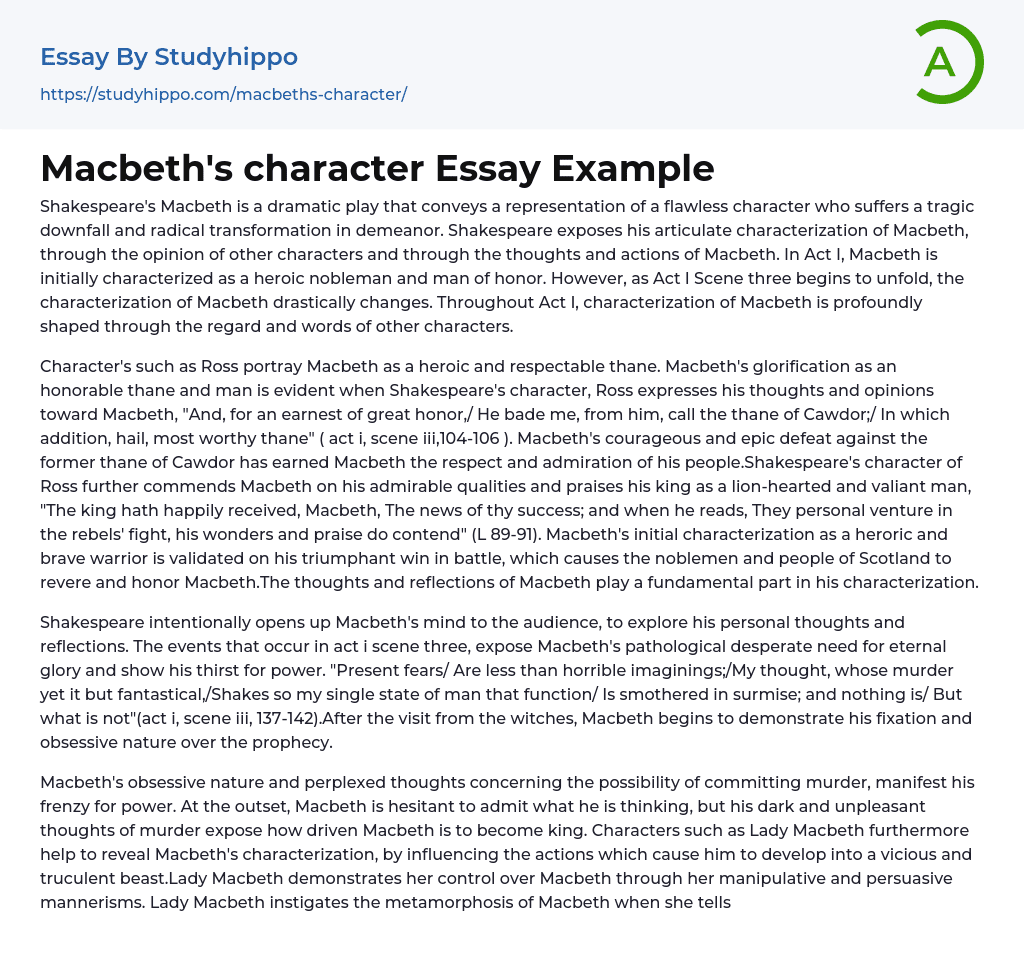Shakespeare's Macbeth is a dramatic play that conveys a representation of a flawless character who suffers a tragic downfall and radical transformation in demeanor. Shakespeare exposes his articulate characterization of Macbeth, through the opinion of other characters and through the thoughts and actions of Macbeth. In Act I, Macbeth is initially characterized as a heroic nobleman and man of honor. However, as Act I Scene three begins to unfold, the characterization of Macbeth drastically changes. Throughout Act I, characterization of Macbeth is profoundly shaped through the regard and words of other characters.
Character's such as Ross portray Macbeth as a heroic and respectable thane. Macbeth's glorification as an honorable thane and man is evident when Shakespeare's character, Ross expresses his thoughts and opinions toward Macbeth, "And, for an earnest of great honor,/ He bade
...me, from him, call the thane of Cawdor;/ In which addition, hail, most worthy thane" ( act i, scene iii,104-106 ). Macbeth's courageous and epic defeat against the former thane of Cawdor has earned Macbeth the respect and admiration of his people.Shakespeare's character of Ross further commends Macbeth on his admirable qualities and praises his king as a lion-hearted and valiant man, "The king hath happily received, Macbeth, The news of thy success; and when he reads, They personal venture in the rebels' fight, his wonders and praise do contend" (L 89-91). Macbeth's initial characterization as a heroric and brave warrior is validated on his triumphant win in battle, which causes the noblemen and people of Scotland to revere and honor Macbeth.The thoughts and reflections of Macbeth play a fundamental part in his characterization.
Shakespeare intentionally opens up Macbeth's mind to th
audience, to explore his personal thoughts and reflections. The events that occur in act i scene three, expose Macbeth's pathological desperate need for eternal glory and show his thirst for power. "Present fears/ Are less than horrible imaginings;/My thought, whose murder yet it but fantastical,/Shakes so my single state of man that function/ Is smothered in surmise; and nothing is/ But what is not"(act i, scene iii, 137-142).After the visit from the witches, Macbeth begins to demonstrate his fixation and obsessive nature over the prophecy.
Macbeth's obsessive nature and perplexed thoughts concerning the possibility of committing murder, manifest his frenzy for power. At the outset, Macbeth is hesitant to admit what he is thinking, but his dark and unpleasant thoughts of murder expose how driven Macbeth is to become king. Characters such as Lady Macbeth furthermore help to reveal Macbeth's characterization, by influencing the actions which cause him to develop into a vicious and truculent beast.Lady Macbeth demonstrates her control over Macbeth through her manipulative and persuasive mannerisms. Lady Macbeth instigates the metamorphosis of Macbeth when she tells him he is too cowardly to commit a murder. "To be the same in thine own act and valor/ As thou art in desire? Wouldst thou have that/ Which thou esteem'st the ornament of life,/ And live a coward in thine own esteem,/ Letting I dare not wait upon I would,"(act i, scene vii, 40-44).
Lady Macbeth plays a crucial role in the development and transformation of Macbeth.Lady Macbeth's constant criticisms and torment causes Macbeth to revaluate his approach to become king. Shakespeare's eloquent style of writing and brilliancy in the development of essential characters and the
thoughts and actions of Macbeth, to articulate the characterization of Macbeth. Macbeth's tragic downfall and transformation as a character is paramount in his characterization because it emits a feeling of repugnance and causes the audience to have a visceral reaction.
- Banquo essays
- Macbeth Ambition essays
- A Doll's House essays
- A Midsummer Night's Dream essays
- A raisin in the sun essays
- A Streetcar Named Desire essays
- An Inspector Calls essays
- Death of a salesman essays
- Everyman essays
- Fences essays
- Hamlet essays
- Hedda Gabler essays
- Iago essays
- King Lear essays
- Macbeth essays
- Much ado about nothing essays
- Oedipus Rex essays
- Oedipus The King essays
- Othello essays
- Pygmalion essays
- Romeo And Juliet essays
- Tartuffe essays
- The glass menagerie essays
- The Importance of Being Earnest essays
- The Merchant Of Venice essays
- The Taming of The Shrew essays
- Twelfth Night essays
- Waiting For Godot essays
- Aldous Huxley essays
- Alice Walker essays
- Amy tan essays
- Anne Bradstreet essays
- Anton Chekhov essays
- Arthur Miller essays
- Augustine essays
- Bertolt Brecht essays
- Booker T Washington essays
- Carol ann duffy essays
- Charles Dickens essays
- Charlotte Perkins Gilman essays
- Chinua Achebe essays
- Christina Rossetti essays
- Consider The Lobster essays
- Edgar Allan Poe essays
- Elizabeth Bishop essays
- Emily Dickinson essays
- Ernest Hemingway essays
- F. Scott Fitzgerald essays
- George Orwell essays
- Harper Lee essays




